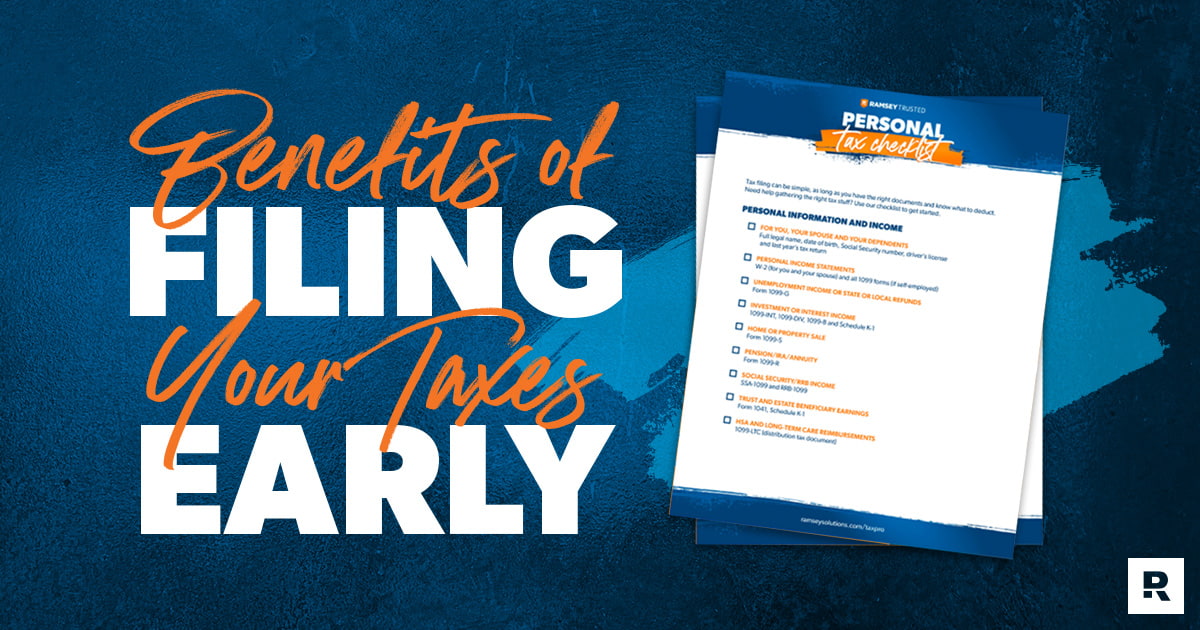
Whether it’s pulling an all-nighter to finish a college term paper or avoiding the gym for the third week in a row—we’ve all been guilty of procrastinating.
But there’s one thing we love putting off until the last minute more than anything else: paying our taxes. (Well, that and going to the dentist.) This year, the hard-and-fast deadline to file your 2023 taxes is Monday, April 15, 2024. The IRS usually starts accepting returns in January.
With over 75% of taxpayers receiving an average income tax refund of $2,812 in 2023, we can’t think of a good reason you’d want to put off filing your taxes.1 Even if you owe money, filing early is to your advantage (we’ll explain in a bit).
Here are six reasons to get your act together early this tax season.
1. Early filers avoid processing delays.
The IRS had a dumpster fire on its hands during the 2023 tax season. At the end of May, the agency still had 2.4 million unprocessed paper tax returns.2
Thousands of taxpayers waited months and months to get their tax refunds. A lot of that was because of the avalanche of paperwork that the IRS had to go through manually.
Their solution? You need to file early, file electronically, and choose to receive your refund via direct deposit. And double-check your forms and information. If you don’t do that or you do it wrong, your tax return is going to get delayed.
2. Early filers eliminate tax deadline stress.
According to a TaxSlayer survey, a majority of taxpayers (61%) say tax season is stressful.3 No shocker there! The survey also found 16% would rather get a root canal than file their taxes.4 Whoa! That’s some serious tax hate.
Any time you’ve got a big, ugly task staring you in the face, it’s best to get it out of the way as soon as possible. Constantly thinking and worrying about something is often much worse than actually doing it. Income taxes are no different. You have to fill out the forms and you have to file them, so just grit your teeth (assuming you haven’t just had a root canal) and get it over with.
Try giving yourself a fake deadline—well ahead of Tax Day—to help get your taxes done early. And once you file that return, give yourself a small reward for being so efficient and responsible. Catch a movie. Go out for steak and ice cream (as long as it’s in your budget). You’ve earned it! Then relax while everyone else stresses out about getting their taxes done on time.
But heads up here: If you’re expecting a refund, don’t get excited and go on a shopping spree before you even get the money. Make a budget and tell every one of those dollars where to go and what to do before they show up in your bank account.
3. Early filers average larger refunds.
Now listen—a tax refund is not free money. Getting a large refund from the IRS just means you’ve been lending Uncle Sam your money (without interest) all year long. He’s just returning what’s already yours!
If you get a refund that’s more than a few hundred dollars, you probably need to work with your HR department to adjust your tax withholdings on your W-4 form. The goal is to have a tax refund as close to zero as possible and increase your take-home pay. Watching those larger paychecks hit your bank account will make you feel like you got a raise!
Don’t settle for tax software with hidden fees or agendas. Use one that’s on your side—Ramsey SmartTax.
That being said, if the government does owe you money this year, you want to make sure you’re getting every dollar that’s rightfully yours—and filing early can help you do that. IRS data shows that taxpayers who file by late February get significantly larger refunds than those who file later—around $400 on average.5,6
Obviously, if you know you’re getting a refund, you’re more likely to file sooner, and that could be part of the reason early filers enjoy larger refunds. But another reason is that the sooner you start on your taxes, the more opportunity you have to make sure you’re claiming all the tax deductions and tax credits you’re eligible for, which takes more time and documentation than claiming the standard deduction. Take note, all you natural procrastinators!
4. Early filers can protect their refunds from identity thieves.
There you are, you feel good about wrapping up your tax return, and then you click submit . . . bam! Rejected. What just happened? Someone using your Social Security number already filed a tax return, and your heart sinks into your stomach as you realize you’re now a victim of tax refund fraud.
And it happens more often than you think. Between 2015 and 2019, the IRS stopped online tax fraudsters from stealing $26 billion through identity theft tax refund fraud.7 And while the IRS was able to thwart most of those robbery attempts, billions still ended up in the hands of these thieves.
Filing early may not completely get rid of the threat of identity theft, but it can protect your refund. If thieves file a return using your Social Security number before you do, the IRS will kick out your return since their records show you’ve already been paid. And if that happens, it can take months to clear up the mess with the IRS and finally receive your refund.
5. Early filers with a tax bill have time to make a plan.
When you’re facing an income tax bill instead of a refund, it’s natural to put off filing as long as possible. But if you go ahead and fill out your tax forms and file them, you’ll know exactly how much you have to pay—and you won’t have to pay in full until Tax Day.
Plus, the more time you have to come up with the money, the less likely you are to bust your budget or drain your emergency fund. So don’t spend the first part of the year with your head in the sand. Get the facts about what you owe, make your plan, and get that tax bill out of the way.
And hey, you can save time and reduce headaches by gathering the right paperwork the first time around. Not sure what you’ll need to have in hand to file your taxes? Download a free tax preparation checklist.
6. Early filers are more likely to get time with a tax professional.
You may have found out the hard way that it’s tough to get on a good tax pro’s schedule during crunch time. In fact, if you need a pro and haven’t set an appointment by at least four weeks out from Tax Day, you may have to file an extension.
On top of that, some tax pros charge more to complete your taxes as the filing deadline approaches. The best way to avoid all that hassle is to get an appointment with your advisor as soon as possible.
If you have a pretty simple return and want to file your taxes with tax software, check out Ramsey SmartTax. It’s a budget-friendly software with no hidden fees.
If your taxes are more complicated, a RamseyTrusted tax pro can help you file with confidence. They know all about tax code so you don’t have to.
Federal Classic Includes:
-
All major income types and federal forms
-
Prepare, print and e-file
-
Phone and email support
-
1 year of audit assistance
Federal Premium Includes:
Everything in Classic plus:
-
Live chat
-
Priority phone and email help
-
Free financial coaching session
-
3 years of audit assistance



